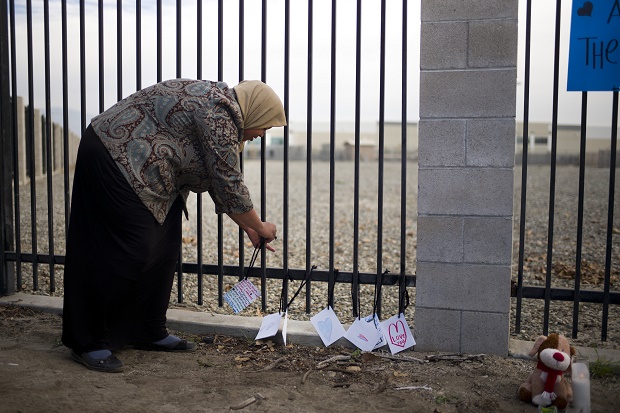California killing spurs concerns about fiance visa program

Kareema Abdul-Khabir, who teaches special needs students at an elementary school in Barstow, Calif., places some cards made by her students at a makeshift memorial honoring the victims of Wednesday’s shooting rampage Friday, Dec. 4, 2015, in San Bernardino, Calif. The FBI said Friday it is officially investigating the mass shooting in California as an act of terrorism, while a US law enforcement official said the woman who carried out the attack with her husband had pledged allegiance to the Islamic State group and its leader on Facebook. AP
WASHINGTON — The woman who carried out the California shooting with her husband immigrated to the US legally last year on a special visa for fiances of US citizens.
Authorities said Friday that Pakistani citizen Tashfeen Malik, 27, pledged allegiance to the Islamic State group and its leader under an alias account on Facebook just moments before she and her husband, Syed Farook, opened fire on a holiday banquet for his co-workers Wednesday, killing 14. They later died in a gun battle with police.
Malik, who had been living with her family in Saudi Arabia and Pakistan, passed several government background checks and entered the US in July 2014 on a K-1 visa, which allowed her to travel to the US and get married within 90 days of arrival.
Malik was subjected to a vetting process the US government describes as vigorous, including in-person interviews, fingerprints, checks against US terrorist watch lists and reviews of her family members, travel history and places where she lived and worked. The process began when she applied for a visa to move to the United States and marry Farook, a 28-year-old Pakistani-American restaurant health inspector who was raised in California.
READ: US Muslim, Arab communities fear backlash from shooting
Foreigners applying from countries recognized as home to Islamic extremists, such as Pakistan, undergo additional scrutiny before the State Department and Homeland Security Department approve permission for a K-1 visa.
“This is not a visa that someone would use because it is easy to get into the US, because there are more background checks on this type of visa than just about anything else,” said Palma Yanni, a Washington-based attorney who has processed dozens of K-1 visas. “But fingerprints and biometrics and names aren’t going to tell you what is in somebody’s head unless they somewhere have taken some action.”
The shooting will undoubtedly have implications on the debate over the Obama administration’s plans to accept more Syrian refugees. The vetting process for refugees is similar, though not identical, to the one for fiance visa applicants. Republican lawmakers and governors across the US, as well as advocates for stricter immigration enforcement, have challenged the effectiveness of the vetting process.
Refugees submit to in-person interviews overseas, where they provide biographical details about themselves, including their families, friendships, social or political activities, employment, phone numbers and email accounts. They provide biometric information, including fingerprints. Syrians are subject to additional classified controls.
Those who come to the US on a fiance visa must marry a US citizen within 90 days or leave the country. Following the marriage, the immigrant becomes a conditional resident for two years and must ask the US government to remove those conditions at the end of that waiting period and undergo another background check. If the request is approved, the immigrant receives a green card. Immigrants can apply to become US citizens five years after winning a green card.
“Can we improve the system as technology grows? There is always room for improvement, but to indict the entire fiance visa system because of this is not the right path,” said David Leopold, a past president of the American Immigration Lawyers Association.
READ: All 14 victims of California shooting named
Those who intersected with Malik in California could not offer much insight, as she was rarely seen in the Muslim community.
The couple was married Aug. 16, 2014, and held their wedding reception at the Islamic Center of Riverside, said Dr. Mustafa Kuko, the center’s director. Kuko said he never met Malik because the party was divided into separate spaces for women and men.
“She never came to our mosque except once when they had their reception, and that night there were so many people around, my wife doesn’t recall exactly how she looks or who she is,” Kuko said. “We never saw her again.”